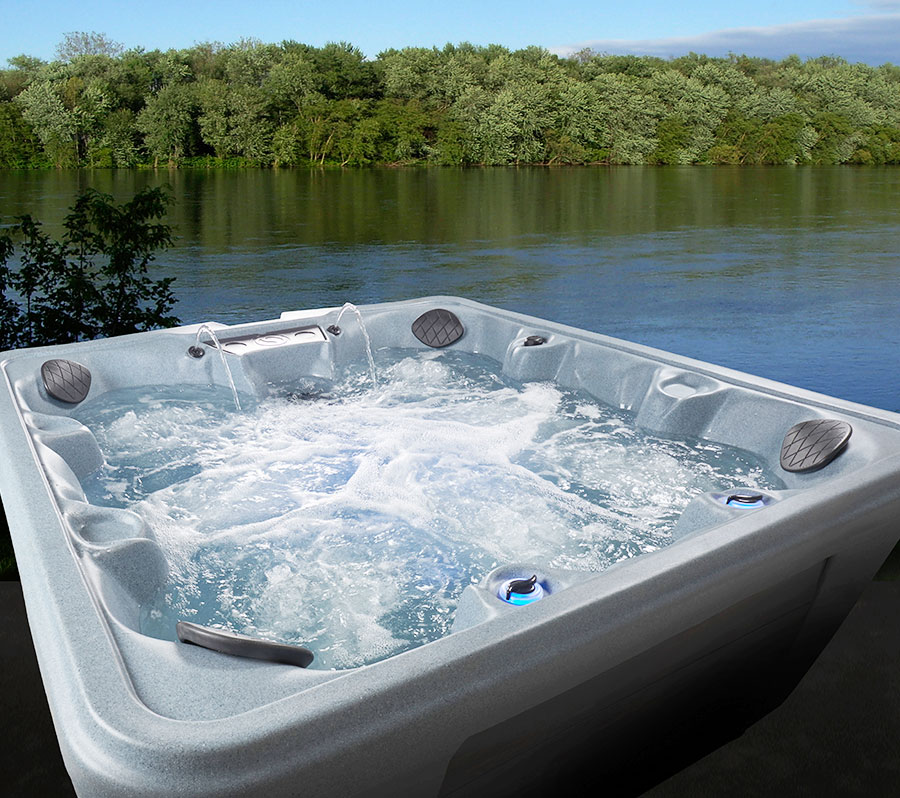Saltwater hot tubs are increasingly popular, offering a modern alternative to traditional spa sanitization methods. At Blue Lagoon Pools in Sinking Spring, PA, we’ve seen an uptick in inquiries about saltwater systems, and we’re here to break down the advantages and disadvantages to help you decide if a saltwater hot tub is the right fit for your lifestyle and spa experience.
What Is a Saltwater Hot Tub?
A saltwater hot tub uses a salt cell system to convert salt (sodium chloride) into chlorine through electrolysis. This process generates a steady supply of pure chlorine to sanitize the water without the need for tablets or granules. By adding about 2 pounds of salt per 100 gallons of water, you can enjoy a low-maintenance, refreshing spa experience.
The Pros of Saltwater Hot Tubs
1. Softer, Silkier Water
Saltwater has a luxurious feel that’s gentler on the skin compared to traditional spa water. It mimics the soothing sensation of a mineral bath, leaving your skin refreshed rather than irritated. The slight salt content (2,000–3,000 ppm) is far less than seawater, making it comfortable for long soaks.
2. Reduced Chemical Handling
One of the biggest benefits is eliminating the need to store and handle harsh sanitizers like chlorine or bromine tablets. The salt system generates chlorine naturally, providing all the sanitizing power without the added chemicals or binders found in traditional methods.
3. Minimal Odor
Traditional hot tubs can produce strong odors due to the buildup of chloramines, which form when chlorine binds with contaminants. Saltwater systems reduce this issue because used chlorine reverts back to salt, keeping your water smelling clean and fresh.
4. Stable Water Chemistry
Saltwater helps buffer your spa water, making it more resistant to sudden changes in pH, alkalinity, and calcium hardness. This added stability reduces the need for frequent water testing and chemical adjustments, giving you more time to enjoy your hot tub.
5. Cost-Effective Over Time
Although there’s an initial investment in the salt system, it eliminates the ongoing expense of purchasing chemical sanitizers. With proper maintenance, saltwater systems can save you money in the long run.
The Cons of Saltwater Hot Tubs
1. Potential Corrosion
Salt can corrode certain materials over time, particularly at high concentrations. However, modern hot tubs are designed to withstand salt levels of 2,000–3,000 ppm, so issues are rare if the water is properly balanced.
2. Salt Cell Maintenance
Salt cells typically last 2–5 years before needing replacement. Regular cleaning and avoiding use in water below 60°F can extend the lifespan of your cell, but replacement costs can range from $200 to $500.
3. Reduced Efficiency in Cold Water
Saltwater systems struggle to generate chlorine in temperatures below 65°F. While this isn’t a problem for most hot tubs that are kept warm year-round, it’s worth considering for spas used seasonally.
4. Upfront Costs
Installing a saltwater system involves an initial investment for the equipment and setup. While this can be offset by reduced chemical costs over time, the upfront price might deter some spa owners.
Is a Saltwater Hot Tub Right for You?
Saltwater hot tubs are a great option for those seeking a low-maintenance, eco-friendly alternative to traditional sanitizers. They’re especially appealing if you value soft, odor-free water and a more stable chemical balance. However, you’ll need to weigh the initial investment and maintenance considerations.
At Blue Lagoon Pools, we’re dedicated to helping you create the perfect spa experience. If you’re considering upgrading to a saltwater system or have questions about maintaining your hot tub, contact us today! Our team is here to guide you every step of the way


